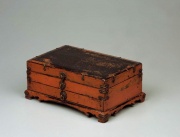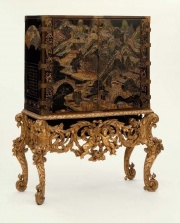Difference between revisions of "Lacquer, Oriental"
(username removed) |
|||
| (4 intermediate revisions by 2 users not shown) | |||
| Line 1: | Line 1: | ||
| − | [[File: | + | [[File:17.1276-SC94948.jpg|thumb|Red lacquered box<br>MFA# 17.1276]] |
== Description == | == Description == | ||
| + | [[File:65.2528a-b-E3846CR-d1.jpg|thumb|Lacquered cabinet<br>MFA# 65.2528]] | ||
| + | A hard, insoluble coating prepared from the resinous exudation of the varnish tree (''Rhus vernicifera)'' and the wax tree (''Rhus succedanea'') native to China and cultivated in Japan . Oriental lacquer, or urushi, contains [[urushiol|urushiol]], hydrourushiol, some polysaccharides (5-7%), laccase (1-2%), and water (20-25%). It thickens and solidifies by oxidative polymerization when exposed to humid air forming a hard, durable film that takes a high polish. Urushi lacquer has been used for at least 6000 years as a protective and decorative coating. It was applied to wooden furniture, musical instruments, weapons, jewelry, and household items. During the 18th century, Oriental lacquerware became very popular in Europe and its appearance was often imitated using non-urushi coatings. Today, urushi is still used for clear and pigmented coating on furniture, dishes, boxes, and decorative items. | ||
| − | |||
| − | |||
| − | |||
== Synonyms and Related Terms == | == Synonyms and Related Terms == | ||
| − | urushi; ''Rhus vernicifera; Rhus succedanea''; urushi (Jap.); yun (Burm.); lacado oriental (Esp.); lacca del Giappone (It); true | + | urushi; ''Rhus vernicifera; Rhus succedanea''; urushi (Jap.); yun (Burm.); lacado oriental (Esp.); lacca del Giappone (It); true lacquer; rhus lacquer |
| − | |||
| − | |||
| − | |||
| − | |||
| − | + | Types include: Oriental lacquer; Asian lacquer; Japanese lacquer; Chinese lacquer; Far East lacquer; Far Eastern lacquer; Ceylon lacquer | |
| − | + | ==Risks== | |
| − | + | * Contact may causes severe irritation. | |
| + | * Oriental lacquer contains urushiol, the chemical that causes poison ivy rash. | ||
| − | + | ==Physical and Chemical Properties== | |
| − | |||
| − | |||
| − | |||
| − | |||
| − | + | * Resistant to solvents, acids and alkalis. | |
| − | = | + | * Deteriorated by ultraviolet light, heat and low relative humidities. |
| + | * Deteriorated samples can be damaged by water. | ||
| + | * Density = 1.002 g/ml | ||
| − | + | ==Resources and Citations== | |
| − | + | * Marianne Webb, ''Lacquer Technology and Conservation,'' Butterworth-Heinemann, Oxford, 2000. | |
| − | + | * N.Umney, "Oriental Lacquer" ''Conservation News'', Number 32, March 1987 and Number 33, July 1987. | |
| − | + | * N.Bromelle, P.Smith (ed.) ''Urushi. Proceedings of the 1985 Urushi Study Group, Japan'', Getty Conservation Institute, Los Angeles, 1988. | |
| − | * | + | * Ishikawa Wajima Urushi Art Museum: www.isei.or.jp/Urushi_Museum/Urushi_Museum.html |
| − | * | + | * Bishop Museum: www.bishop.hawaii.org/bishop/conservation/lacquer.html |
* ''The Dictionary of Art'', Grove's Dictionaries Inc., New York, 1996 Comment: F.Minney, "Lacquer" | * ''The Dictionary of Art'', Grove's Dictionaries Inc., New York, 1996 Comment: F.Minney, "Lacquer" | ||
| Line 56: | Line 50: | ||
* ''Dictionary of Building Preservation'', Ward Bucher, ed., John Wiley & Sons, Inc., New York City, 1996 | * ''Dictionary of Building Preservation'', Ward Bucher, ed., John Wiley & Sons, Inc., New York City, 1996 | ||
| − | * Art and Architecture Thesaurus Online, | + | * Art and Architecture Thesaurus Online, https://www.getty.edu/research/tools/vocabulary/aat/, J. Paul Getty Trust, Los Angeles, 2000 |
[[Category:Materials database]] | [[Category:Materials database]] | ||
Latest revision as of 14:53, 6 October 2022
Description
A hard, insoluble coating prepared from the resinous exudation of the varnish tree (Rhus vernicifera) and the wax tree (Rhus succedanea) native to China and cultivated in Japan . Oriental lacquer, or urushi, contains Urushiol, hydrourushiol, some polysaccharides (5-7%), laccase (1-2%), and water (20-25%). It thickens and solidifies by oxidative polymerization when exposed to humid air forming a hard, durable film that takes a high polish. Urushi lacquer has been used for at least 6000 years as a protective and decorative coating. It was applied to wooden furniture, musical instruments, weapons, jewelry, and household items. During the 18th century, Oriental lacquerware became very popular in Europe and its appearance was often imitated using non-urushi coatings. Today, urushi is still used for clear and pigmented coating on furniture, dishes, boxes, and decorative items.
Synonyms and Related Terms
urushi; Rhus vernicifera; Rhus succedanea; urushi (Jap.); yun (Burm.); lacado oriental (Esp.); lacca del Giappone (It); true lacquer; rhus lacquer
Types include: Oriental lacquer; Asian lacquer; Japanese lacquer; Chinese lacquer; Far East lacquer; Far Eastern lacquer; Ceylon lacquer
Risks
- Contact may causes severe irritation.
- Oriental lacquer contains urushiol, the chemical that causes poison ivy rash.
Physical and Chemical Properties
- Resistant to solvents, acids and alkalis.
- Deteriorated by ultraviolet light, heat and low relative humidities.
- Deteriorated samples can be damaged by water.
- Density = 1.002 g/ml
Resources and Citations
- Marianne Webb, Lacquer Technology and Conservation, Butterworth-Heinemann, Oxford, 2000.
- N.Umney, "Oriental Lacquer" Conservation News, Number 32, March 1987 and Number 33, July 1987.
- N.Bromelle, P.Smith (ed.) Urushi. Proceedings of the 1985 Urushi Study Group, Japan, Getty Conservation Institute, Los Angeles, 1988.
- Ishikawa Wajima Urushi Art Museum: www.isei.or.jp/Urushi_Museum/Urushi_Museum.html
- Bishop Museum: www.bishop.hawaii.org/bishop/conservation/lacquer.html
- The Dictionary of Art, Grove's Dictionaries Inc., New York, 1996 Comment: F.Minney, "Lacquer"
- R. J. Gettens, G.L. Stout, Painting Materials, A Short Encyclopaedia, Dover Publications, New York, 1966
- Ralph Mayer, A Dictionary of Art Terms and Techniques, Harper and Row Publishers, New York, 1969 (also 1945 printing)
- Hermann Kuhn, Conservation and Restoration of Works of Art and Antiquities, Butterworths, London, 1986
- G.S.Brady, Materials Handbook, McGraw-Hill Book Co., New York, 1971 Comment: p. 435
- Michael McCann, Artist Beware, Watson-Guptill Publications, New York City, 1979
- The American Heritage Dictionary or Encarta, via Microsoft Bookshelf 98, Microsoft Corp., 1998
- Dictionary of Building Preservation, Ward Bucher, ed., John Wiley & Sons, Inc., New York City, 1996
- Art and Architecture Thesaurus Online, https://www.getty.edu/research/tools/vocabulary/aat/, J. Paul Getty Trust, Los Angeles, 2000

